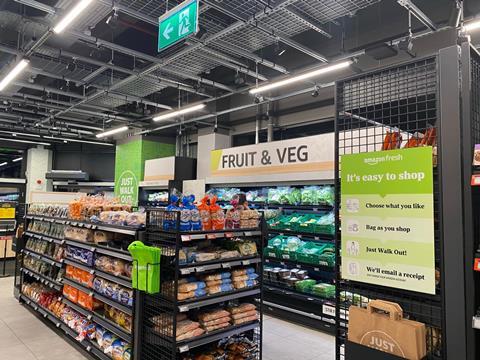More than half of online giant’s grocery suppliers surveyed by GCA believe it is not complying with code of practice

Amazon’s treatment of suppliers has been thrown into the spotlight after Groceries Code Adjudicator (GCA) Mark White said its performance had deteriorated significantly over the past year.
Fewer grocery suppliers are experiencing issues with their retailer customers, according to the GCA’s 2024 annual survey. However, less than half of respondents directly supplying Amazon believed that it consistently or mostly complies with the Groceries Supply Code of Practice (GSCoP).
Despite the overall improvement in the treatment of suppliers, Amazon’s perceived code compliance score fell from 59 per cent to just 47 per cent. White has subsequently told Amazon that it must take “swift and comprehensive action to demonstrably comply with the code”.
Threat of investigation
White said his office is monitoring changes that Amazon is making and their impact on suppliers to determine whether they are sufficient.
“The survey shows clearly that many suppliers do not believe that Amazon is complying with the Code,” White stressed. ”Amazon must ensure suppliers understand the changes it has made since its designation and in response to these survey results, and make any further changes that are needed to ensure code compliance.
“I will not hesitate to launch a formal investigation if appropriate and necessary to ensure Amazon is treating its suppliers fairly and lawfully. I encourage suppliers to continue to confidentially tell me about the issues they are facing with Amazon.”
An Amazon spokesperson, quoted by various media outlets, said: “We are very disappointed by these results and we are committed to improving them. We have made a series of improvements to our grocery supplier experience since last year’s results, with clearer explanations for cost price increase decisions, minimum periods for delisting, and the launch of a major upgrade for handling invoice disputes.
“We will be making further changes, with faster time-frames to resolve more types of financial disputes, as well as strengthened account management support for smaller suppliers.
“There is still more to do. We are committed to working with the Groceries Code Adjudicator, building long-term sustainable relationships with our suppliers, and continuing to create opportunities for suppliers of all sizes to reach millions of customers in the UK and around the world.”
Improvement on CPIs
The results of the eleventh annual survey, which received more than 3,000 responses, show that the number of suppliers experiencing a code issue fell from 36 to 33 per cent.
There was a significant improvement in relation to cost price increases (CPIs), which was a major sticking point for suppliers last year. As food price inflation has fallen, the number of suppliers that requested at least one CPI from a retailer over the previous 12 months fell from 91 per cent in 2023 to 67 per cent in 2024.
The number of suppliers highlighting a retailer’s response to a CPI as an issue almost halved, falling from 28 per cent in 2023 to just 16 per cent.
There has also been improved performance against other issues impacting suppliers. Some 21 per cent of suppliers highlighted inadequate processes in place to enable invoice discrepancies to be resolved promptly, compared to 25 per cent of suppliers in 2023, while 11 per cent of suppliers highlighted data input errors not being resolved promptly, compared to 16 per cent in 2023.
The survey also included a question on cost price decreases (CPDs) for the first time. Only 5 per cent of suppliers highlighted concerns about how a CPD had been requested by a retailer.
“I am encouraged to see improvements in retailers’ treatment of suppliers across a range of issues including the management of cost price increase requests but also resolution of invoice discrepancies and data input errors,” said White.
Compliance performance
Overall compliance scores across the retailers ranged from 98 per cent to 47 per cent, with an average compliance across all 14 retailers of 91 per cent compared to 92 per cent in 2023. Excluding Amazon, average compliance was 94 per cent, which was unchanged from the non-Amazon score in 2023.
For the first time, Co-op came top of the 14 retailers for overall code compliance with 98 per cent. Co-op and Lidl both experienced a 2 per cent improvement, which was the biggest percentage improvement across the 14 retailers.
Meanwhile, the GCA has launched registration for its hybrid annual conference, taking place on 1 October 2024. YouGov will share the results of the deep dive at the conference, the adjudicator will discuss how the GCA is responding to the survey, and there will be discussions on overcoming challenges facing the sector.
The registration form is available here.



